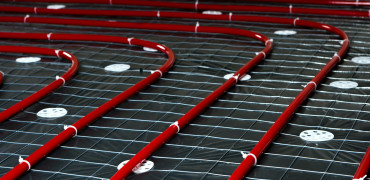Over the past year on the Hub, we have posted numerous articles explaining the benefits to your home (and bank balance) of focusing on ways to improve your energy efficiency.
But the term energy efficiency shouldn’t just be applied to doing something that helps you to lower your carbon footprint and energy bills. Creating a positive energy environment in your home will help you to be more efficient, happier, and calmer and ultimately help you to love your home even more that you already do.
While it may seem a little ‘hippy dippy’ to some, many cultures – especially those in Asia, as well as in Scandinavia put a lot of focus on creating positive energy at home, and as some of the happiest nations in the world, there must be something to it and something we can all learn from.
“Chi” for example is a Chinese term for energy that gives life. Energy essentially flows through your body and rules the universe around you, moving up or down depending on variants – hence the shiver you get down your spine when you find yourself in an uncomfortable “bad energy” environment.
Scientifically this concept is also mirrored in different energies within the world and how they affect our emotions. So if this interests you, I’d recommend you have a look online and make your own judgement.
Why is positive energy important?
Positive energy at home could help you sleep better, lower your stress levels, encourage tranquillity, make you more productive and declutter your mental state allowing you to have better focus.
For me however, creating positive energy to gain these benefits isn’t about blessing your house with incense or chanting away the spirits (I admire those who go to that length!) it’s about taking a little bit of inspiration from three concepts that can be easily applied to any home; Feng Shui, Hygge and minimalism.
For me, creating positive energy to gain these benefits isn’t about blessing your house with incense or chanting away the spirits
Feng Shui
Feng Shui relates to Chi and is a concept that aims to harmonise people and the environment around them. It’s actually quite complicated and scientific when you look into it – although some people are sceptical of its existence.
Feng Shui can be linked to Chinese culture as far back as 4000BC so is deep rooted in a lot of their practices, traditions and teachings. Today however, Feng Shui has been popularised by celebrities, often making us all snigger when they appoint a “Feng Shui Consultant” to cleanse their multi-million dollar Hollywood homes.
However, in reality there are thousands of books and websites available to help you delve into the details and really understand the tradition.
For me, I find that even if you aren’t a believer, a few simple changes at home can at least give you a more harmonious feeling (and won’t require a consultant) – whether its Feng Shui related or not.
So what are these harmonious Feng Shui inspired changes?
-
Many Feng Shui books talk about trapped energy, usually caught on objects cluttering your home. So harmonious change number one is to reduce your clutter and ensure your doorways and hallways are not blocked by furniture and other objects.
-
As a Libra, I am very sensitive to things being off balance so my second harmonious change is just to ensure that any items in your house – like a wonky picture frame, are centred.
-
It might sound crazy but according to Feng Shui your cooker represents your wealth and your career, so if those are important to you, you need to keep your cooker clean! For me keeping your home clean (not just your cooker) is also important in harmonising your environment.
Hygge
Hygge is a Scandivanian/Danish concept which I’ve spoken about previously here.
Essentially it’s about building a sanctuary full of things and people that make you warm, cosy and happy.
Hygge has been popular for a long time but became very mainstream around 2016 when the market was flooded with books on how to make your home and lifestyle fit the Hygge characteristics.
Much like Feng Shui the Hygge concept emphasises positive energy so below are my top three Hygge suggestions to help you love your home.
- Make sure your home is warm and will remain warm at least over the winter period. A warm home is a happy home and a happy home is Hygge, so ensuring you have insurance on your heating system will provide harmonious peace of mind and give your home that warm, cosy and loving feeling.
- As we’ve learnt from Feng Shui, decluttering your home is good for positive energy. But in terms of your “Hygge happiness”, surrounding yourself only with the things you love means clearing out that stuff which doesn’t add value to your life so this hits two nails on the head.
- Think of those things you love doing at home and do more of them! For many people that’s cooking, so on that clean cooker you now have, use it to cook more of the food you love and make your home an entertaining space where all your friends love to be.
Minimalism
Minimalism is a movement which has been applied to many things, especially the arts where paintings use basic techniques and colours. Minimalism as a lifestyle movement however has been very popular in the past decade, comprising of techniques from cultures all over the world such as the Japanese art of organisation.
Minimalism is also associated with Scandinavia due to factors like the aesthetic of their buildings and style as well as their emphasis of sustainability and green living.
In America Minimalism has spawned many documentaries and the concept has had a large impact on their society.
As a concept, Becoming Minimalist sums it up as intentionally trying to live with only the things you really need. Being a minimalist is having clarity, purpose and intention.
So how can being minimalist also help you to love your home?
- Decluttering has featured a lot throughout this article, so for me the minimalist way to do this is to look at what you have and only keep what has intention in your life. Do you have both a coffee machine and a kettle but only find yourself using the latter? Decluttering electrical items (which are one of the most popular types of items people hoard) helps harmonise your home and your energy bills.
- To go alongside the declutter, organisation is a big part of being minimalist. Everything in your home should have its place helping you to get less stressed about where items are and helping with tidying things away.
- As purpose is a key characteristic of being minimalist, this means that in your home you should make a conscious effort to use what you have and purchase less. For example if you have 10 cleaning products and only use half, give away the other half to friends and family and only repurchase what needs replacing when used up. That is also true of food, clothes and other types of consumables that take up space and are often wasted.
Final thoughts
All in all these three concepts emphasise that your home should be a sanctuary, clean and free of any items that do not bring you joy. Having fewer items has a lower impact on your bank balance, is less worry and, long term it sets you up for a mind-set where everything you do and everything you buy has purpose and intention in your life.
Regardless of these concepts however, the underlining theme of how to love your home is to do what makes you happy because then your positive energy will shine through.
Ellina Webb is a Senior Marketing Executive at Mitsubishi Electric
If you have any questions about this article, you can contact us via email. Or if you would like to tweet us, please follow our MEUK_LES twitter page.
We upload new articles every week so remember to check back regularly.
You can also sign up for our monthly newsletter below.



